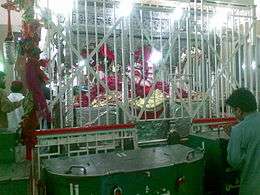Qalandar

| Part of a series on |
| Islam |
|---|
 |
|
Related topics |
|
| |
|---|
 |
|
Lists |
| Islam portal |
Qalandars (Arabic: قلندر), are wandering ascetic Sufi dervishes who may or may not be connected to a specific tariqat. They were mostly in Central Asia, India and Pakistan, in the latter "qalandar" is also used as a title.[1] Some famous Qalandars include Lal Shahbaz Qalandar, Bu Ali Shah Qalandar and Shams Ali Qalandar.[2]
Qalandar as honorific title
Qalander is a person who has excelled in seeing things and advances stage by stage into the Being. He even rises above the Administrative System and witnesses the core of Oneness in detail and after enjoying the Unity of the Being returns back without losing his grades and then reaches back into his humanly status, so much so that his rise and fall becomes one and the same thing for him.. He witnesses part in the whole and sees the whole in the part and, then, after detaching himself from all this, plunges into a state of ecstasy.
Status of a Qalander is even higher than the loved ones because duality remains there even in that state, i.e. one is the loved one and the other is the loving. In Qalanderiyat there is no duality.(From Book of Khwaja Shamsuddin Azeemi's Tazkira Qalandar Baba Aulia)...ksars.org
Qalandar is a title given to a saint who is at a very high level of spirituality. They are different from other saints and have very strong feelings of love for God's creation. Qalandars, among the saints, are those persons who may enjoy freedom from the ties and bounds of time and space. It is claimed that all living things are given in their charge and command, every part of the universe may be at their disposal but these holy people are far above temptation, greed or lust. When people request them they feel duty-bound to listen and rectify the cause of miseries of people because they have been appointed by God for this very purpose.
Qalandars have always spread the message of love and humanity, they are always in the state of ecstasy and their actions are with the will of God. They are "Wali Allah". Among contemporary people who hold the title Qalandar are Shams Ali Qalandar[3] of Punjab, Pakistan, Shahbaz Qalander, Nathar Vali, Baba Fakruddin , Bu Ali Qalandar, Hazrat Muhammad Qalandar, Javagal Shariff, India and Hadrat Masoom Shah Hayat Qalandar, Memari, Burdwan, (WB), India.
Songs honoring famous Qalandars are called Qalandri dhamaal in Pakistan and India. Dhamaal are a popular South Asian musical subgenre about Sufi saints such as Lal Shahbaz Qalandar. These songs typically incorporate qawwali styles as well as different local folk styles, such as bhangra and intense naqareh or dhol drumming.[4]
Origin
The Qalandariyya were an unorthodox tariqa of roaming Sufi dervishes that originated in medieval al-Andalus as an answer to the fundamentalist onslaught of the Almohad Caliphate. From there they quickly spread into North Africa, the Mashriq, Greater Iran, Central Asia, Pakistan and India.[5][6]
See also
- Dervish
- Fakir
- Qalandar (caste)
- Qalandariyah
- Lal Shahbaz Qalander
- Mast Qalandar
- Rabia Basri
- Tando Jahania
- Sadhu
References
- ↑ Baldick, Julian (2000) Mystical Islam: an introduction to Sufism Tauris Parke Paperbacks, London, p. 66, ISBN 1-86064-631-X
- ↑ Schimmel, Annemarie (1980) Islam in the Indian subcontinent E.J. Brill, Leiden, page 34, ISBN 90-04-06117-7
- ↑ "Teachings of sufism/tasawuf by Shams Ali Qalandar". Shams Ali Qalandar.
- ↑ Malik, Iftikhar Haider (2006). Culture and customs of Pakistan. Greenwood Press, Westport, Connecticut, page 171, ISBN 0-313-33126-X
- ↑ Ivanov, Sergej Arkadevich (2006) Holy fools in Byzantium and beyond Oxford University Press, Oxford, UK, page 368, ISBN 0-19-927251-4
- ↑ de Bruijn, J. T. P. "The Qalandariyyat in Persian Mystical Poetry from Sand'i Onwards". In Lewisohn, Leonard (ed.) (1992) The Legacy of Mediæval Persian Sufism Khaniqahi Nimatullahi, London, pp. 61–75, ISBN 0-933546-45-9
Sources
- Ewing, Katherine Pratt (1997). Arguing Sainthood: Modernity, Psychoanalysis, and Islam. Durham, North Carolina: Duke University Press. ISBN 0-8223-2026-6.
